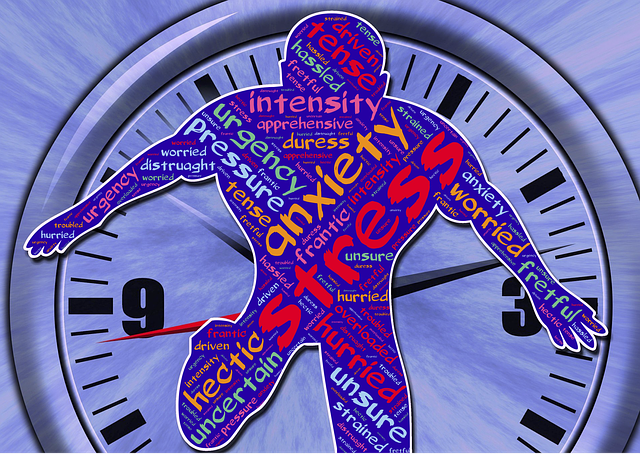How to Advocate For Yourself—And Your Mental Health—At Work

I was first diagnosed with an anxiety disorder when I was in college. I was taking a test when something snapped inside of me and I was suddenly no longer in charge of my own body. It was terrifying. My heart was pounding in my chest and my stomach was curled into knots. I thought I was having a heart attack.
It took several trips to the emergency room for me to finally understand that I had been suffering from panic attacks. My diagnosis came as a relief. I knew where to get help. I found a psychiatrist who prescribed me an antidepressant and a therapist who could teach me coping skills to manage my anxiety and work through unhealthy thought patterns.
With these tools in place, I was able to finish college and enter the workforce. I still dealt with anxiety and panic, however the more practice I got, the less power it had over me. But, as anyone with a chronic mental or physical illness knows: sometimes you have flare-ups. And when a flare-up is detrimental to your career and affecting your work, it’s helpful to understand your rights in the workplace.
Early in My Career, I Didn’t Know My Rights When It Came to Mental Illness
Shortly after college I landed a dream job working as a performer in a live stage show for a large corporation. For the first time ever I had good pay and full benefits. I loved the work and my coworkers. Then, two years into my time with the company, my anxiety disorder stomped onto the scene.
Outside of work I had experienced a traumatic event that rattled me. With my sense of personal safety compromised, I started having daily panic attacks which quickly wore me down both physically and emotionally. Suddenly the pressure of my job was more than I could bear, and I would break down in tears at the thought of going onstage.

After several weeks of calling out of shows at the last minute, crying in the hallways, and feeling embarrassed about the impression I was giving to my castmates and managers, I became worried I would be fired. I couldn’t bear the humiliation of being let go at such a low point in my life, so I quit.
I was unemployed and I had lost my health insurance, but at least the stress was gone and I was free to heal in private.
Then I Learned I Was Legally Protected
As the years went on, I became an advocate for others who live with mental illness. It wasn’t until I was researching a new book I was writing that I learned something that would have helped me immensely back when my own mental illness came between me and a job I absolutely loved. Thanks to the Americans with Disabilities Act, diagnosed mental health conditions including (but not limited to) anxiety disorder, depression, ADHD, bipolar disorder and schizophrenia are protected from workplace discrimination.
What does that mean? That means it would have been illegal for me to be fired, demoted, or given disparate treatment at work on the basis of my condition. And it means that I had the right to ask for reasonable accommodations to help me get through that challenging time while still doing the essential functions of my job.
Here are some examples of reasonable accommodations:
- A flexible work schedule
- Job restructuring
- The opportunity to work from home if needed
- An adjustment to your work location
- Permission to bring a service animal to the office
- A quiet room for you to take breaks
- Reassignment to a vacant position
Check out askjan.org for an exhaustive list of possible accommodations. According to the law, nothing is off the table, so long as it still allows you to do the job you were hired to do and it doesn’t cause undue hardship to your employer.
Here’s How I Tested Out the Law
Armed with my new knowledge, I decided to apply for reasonable accommodation at my current job. I was still performing, and our show required occasional overnight dress rehearsals. We would start at 11pm and rehearse until 8am, usually running the show more times than was necessary just because management felt obligated to have us “work” the entire shift. No matter how I tried to prepare myself, feeling overtired would trigger my anxiety and I would usually end up having a panic attack.
I came up with an idea for an accommodation that would allow me to do all my rehearsal runs at the beginning of the night and be permitted to leave by 1am. It was a daunting prospect. I knew I would have to explain to someone in detail the nature of my anxiety and why I needed the modified schedule. And I knew that my coworkers who were forced to wait out the long nights while I was given special treatment would wonder what was going on. But at the end of the day, reducing my suffering and being able to perform my job was more important than what others thought of me.
Remember, Your Privacy is Protected By Law
Whenever I talk about accommodations, the biggest concern I hear from people is over the need to disclose their condition to their employer. People want to stand up for the rights they deserve, but they don’t want to share their private information with people they don’t trust. I’ve been there and I know it can be terrifying. There is still a lot of stigma and misinformation in our culture around mental illness, and we can never be sure who will be understanding, and who will judge.
First, it is important to know that your privacy is protected by the law. Any information you share with an HR representative about your condition may not be further shared with any of your managers or coworkers (except on an “as needed” basis to enact your accommodation). If this is violated you would be within your rights to report that violation to the EEOC or even pursue legal action.

Here’s How to Talk To Your Employer
Start by simply explaining to the appropriate HR representative that you have “a disability” and would like to request an accommodation. They may not request any more information, but they do have the right to ask for medical documentation to verify your condition. Depending on the size and structure of the company, your accommodation may be granted immediately, or you may be given paperwork that needs to be filled out by both you and your doctor.
In my case, the paperwork was very specific. I had to get my doctor’s signature on a form given to me by HR (not the doctor’s letterhead), with a brief explanation of my diagnosis, how my condition was affecting me at work, and how the accommodation I was requesting would enable me to do my job more comfortably.
Then that paperwork was returned to HR and reviewed by several levels of management before I received word that the company had deemed my accommodation “reasonable” and it was being granted.
What If Your Request is Denied?
Ultimately, it is at the discretion of your employer whether your request is approved or not. If they feel your request causes the company undue hardship or that your accommodation would mean you would no longer be doing the work you were hired to do, they may say “no”.
If that happens, you still have options. Perhaps they just don’t have the full picture. Request further information from them on why the accommodation was denied and ask for an opportunity to explain in more detail why your proposed plan is an effective solution for you and a reasonable one for the company. If that fails, you are free to engage advocacy or legal services for support. The Job Accommodation Network is a great resource and has people on staff to help you with this.
You Can Make This System Work for You
The accommodation system isn’t a perfect one, especially for invisible issues like mental illness. It’s hard to advocate for your needs at work when they are not fully understood by so many. Proving discrimination is also difficult. Retaliation can easily be disguised as “we’re just going another direction”.
But with some thoughtful preparation, you can make this system work for you. Your mental health issues are not a personal failing, nor are they something to be ashamed of. You deserve to build a career that you love free from unnecessary suffering. You have rights. I’m rooting for you.
Note: This author is not a legal professional. Please do appropriate research and consult professionals in the field before taking any legal action.
This guest post was authored by Reba Buhr

Reba Buhr, author of Get Thee to a Therapist is an actress, host, and voiceover artist based in Los Angeles, CA. Reba is also an outspoken mental health advocate. She uses her instagram @get.thee.to.a.therapist to educate people about accessing mental health services and how to overcome the stigma, fear, and other barriers to care that keep people from finding the healing they deserve.
*******
Ms. Career Girl strives to provide valuable insights you can use. To see more from our columnists and guest authors, check these out! Or subscribe to our weekly email featuring our latest articles. We’re also present on Medium!

